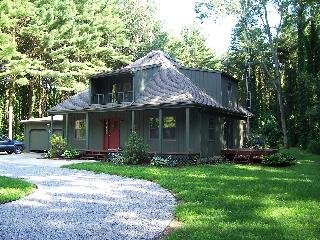Most water testing labs, both those run by your local health department and private water testing labs offer packages of tests for clusters of common private water supply contaminants.
If you want water tests not offered through your local health department don't hesitate to use a private water testing laboratory, provided the lab is licensed by your state. Beware - a few labs offer water tests in states where they have no license to do so, possibly using methods which are not approved by state authorities. Remember to ask.
If you are moving into a home and are testing water for the first time, it is recommended to order one of the more extensive test packages, typically costing $200 to $300.
If that test detects no problems, it is recommended to follow-up testing the water supply annually, using a less costly minimum screen for bacteria or coliform bacteria, typically costing less than $50.
Another tip: if a home is new to you, ask the neighbors, the local health department, and local labs if they are aware of any special contamination issues on your street or near your home. By doing so, you may want to order tests for unusual contaminants which otherwise no newcomer would have thought to look for.
More information such as: Choices of Water Tests & Fees: A Summary of Types of Water Tests, Degrees of Comprehensive Water Testing, Details of Water Test Parameters and Maximum Allowed Drinking Water Contaminant Levels,
Can be found at the below link:
http://www.inspectapedia.com/water/watrtest.htm
Source: The American Society of Home Inspectors
Saturday, July 23, 2011
Mold Information
The media sounded an alarm, the public heard the horror stories, and now homebuyers worry about the presence of molds in the homes they purchase.
If the high-profile status of molds is relatively recent, the subject of all the concern has been around forever. According to the United States Environmental Protection Agency (EPA), "Molds can be found almost anywhere; they grow on virtually any substance when moisture is present. Outdoors many molds live in the soil and play a key role in the breakdown of leaves, wood and other plant debris."
EPA says molds are here to stay. "There is no practical way to eliminate all mold and mold spores in the indoor environment; the way to control indoor mold growth is to control moisture."
But homebuyers want to know more than this. Unfortunately, just as when the public first became aware of asbestos, radon and problems with E.I.F.S., the body of knowledge about molds in indoor environments is far from complete.
What is known, according to the EPA, is that "molds can trigger asthma episodes in individuals with an allergic reaction to mold." Because of this health factor, it recommends the Center for Disease Control (CDC) as a source of information.
Here is a link to the EPA: A Brief Guide
http://www.epa.gov/mold/moldguide.html
Source: The American Society of Home Inspectors
If the high-profile status of molds is relatively recent, the subject of all the concern has been around forever. According to the United States Environmental Protection Agency (EPA), "Molds can be found almost anywhere; they grow on virtually any substance when moisture is present. Outdoors many molds live in the soil and play a key role in the breakdown of leaves, wood and other plant debris."
EPA says molds are here to stay. "There is no practical way to eliminate all mold and mold spores in the indoor environment; the way to control indoor mold growth is to control moisture."
But homebuyers want to know more than this. Unfortunately, just as when the public first became aware of asbestos, radon and problems with E.I.F.S., the body of knowledge about molds in indoor environments is far from complete.
What is known, according to the EPA, is that "molds can trigger asthma episodes in individuals with an allergic reaction to mold." Because of this health factor, it recommends the Center for Disease Control (CDC) as a source of information.
Here is a link to the EPA: A Brief Guide
http://www.epa.gov/mold/moldguide.html
Source: The American Society of Home Inspectors
Subscribe to:
Posts (Atom)

.jpg)



